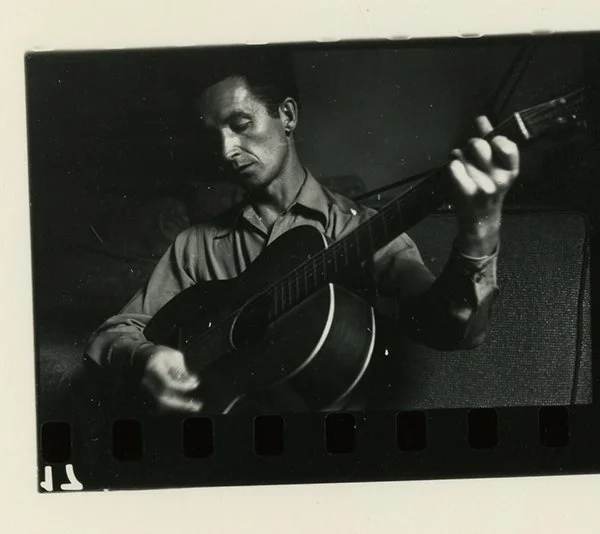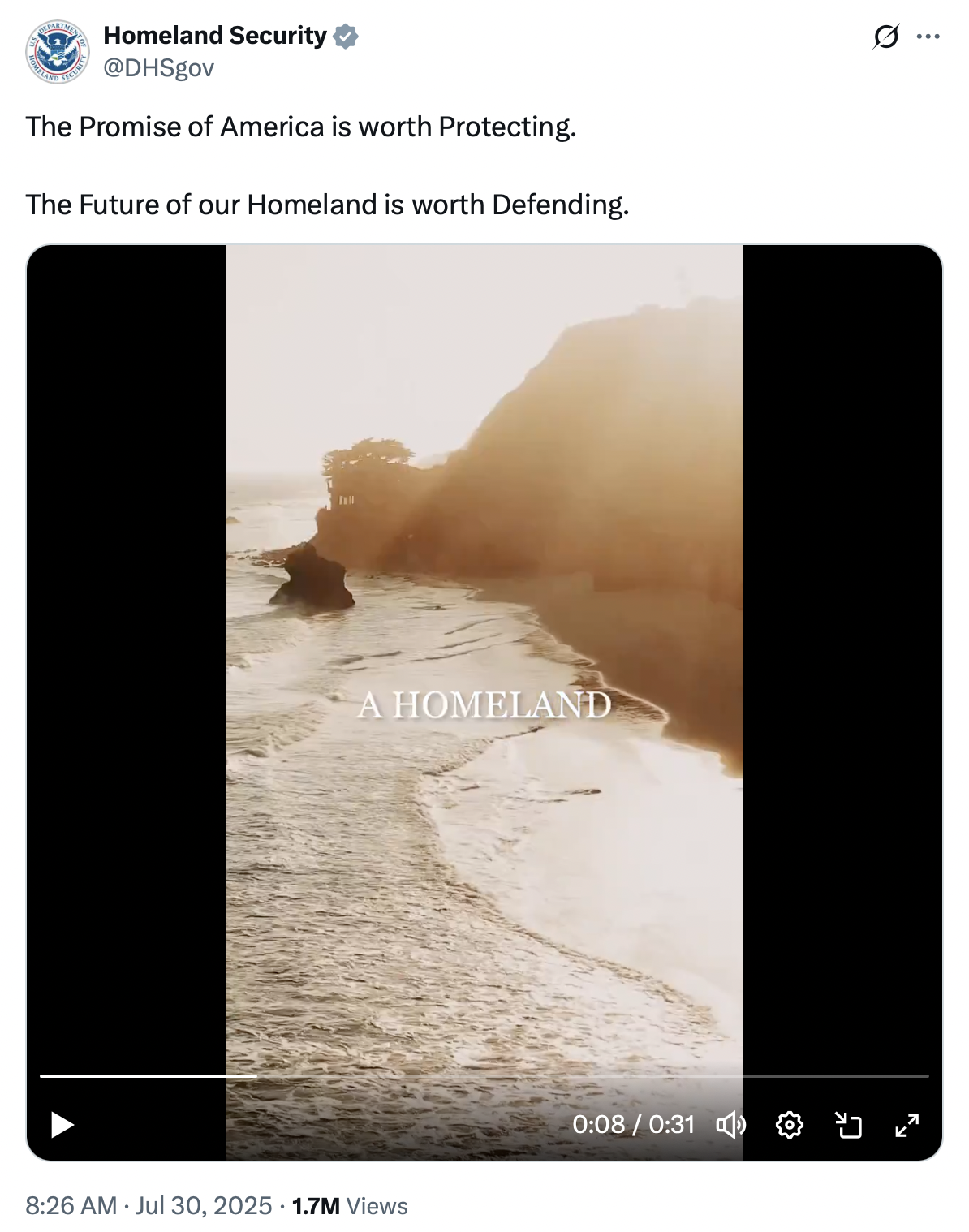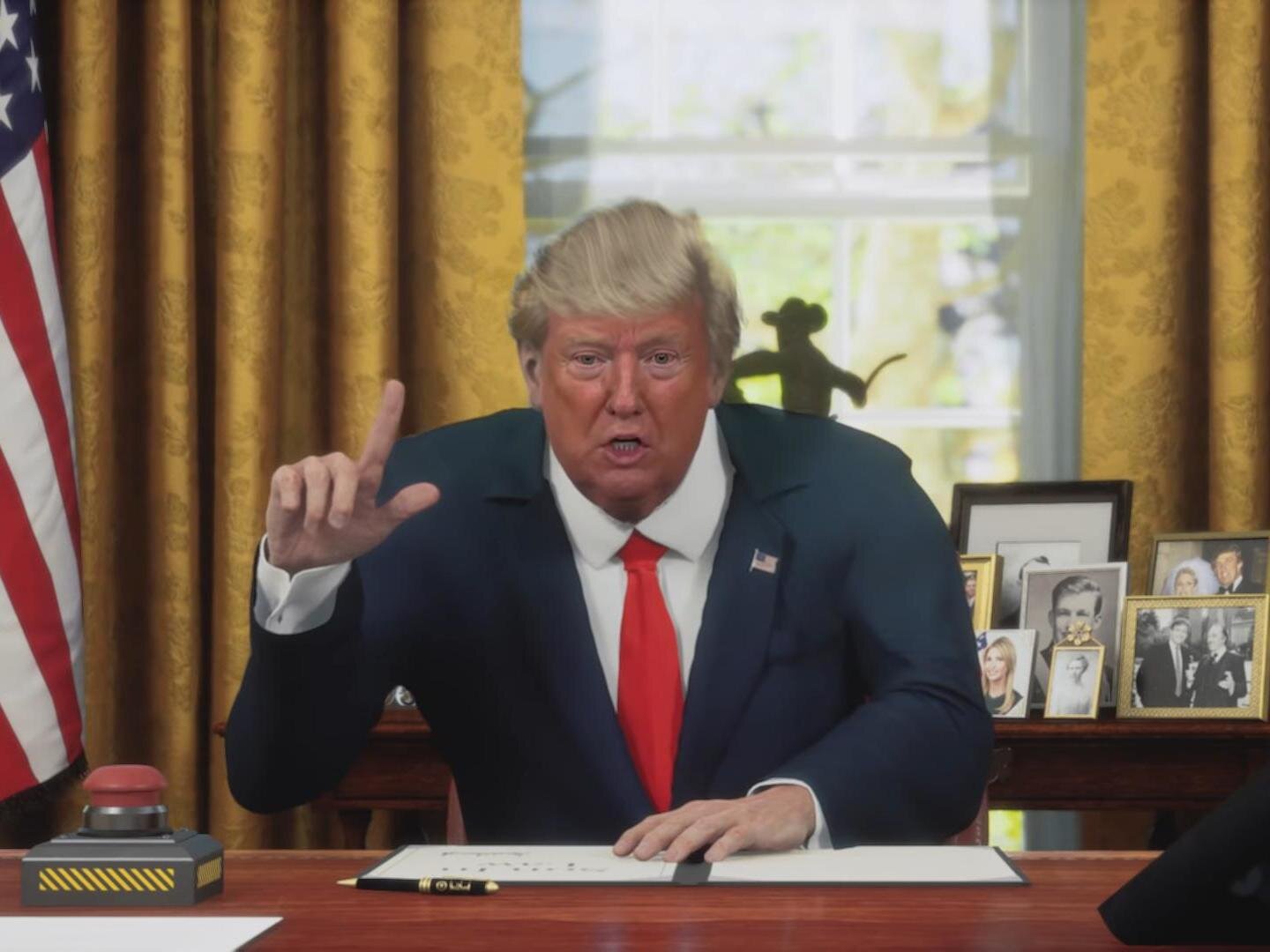Woody Guthrie vs. The Current Administration

Woody Guthrie, by Sid Grossman
The famed folk singer died in 1966, but a new album highlights his differences from the Trump administration.
In 2016, presidential candidate Donald Trump railed against Judge Gonzalo Curiel, who presided over the Trump University case. Trump dismissed Curiel as “Mexican” even though he is an American born in Indiana, and that kind of racial essentialism has been a through line for Trump. No matter what steps people or their parents have taken to be American, they’re never more than their ethnic origin.
At that time, I thought about Los Super Seven’s version of Woody Guthrie’s “Plane Crash at Los Gatos (Deportee).” Guthrie wrote the song after a plane flying deported migrant workers back to Mexico crashed, killing everyone on board. When The Fresno Bee reported on the crash, it identified the dead not by name but as 28 deportees. That dehumanizing dismissal bothered Guthrie, particularly when migrant labor had already become essential to the American farm industry, and harvesting couldn’t take place without it.
There are countless versions of “Deportee” in the world including ones by such folk stalwarts as Pete Seeger and Joan Baez. The version by Los Super Seven stayed with me in part for structural reasons. The band featured Tex-Mex stars Freddy Fender, Flaco Jiménez, and Rick Trevino, along with David Hidalgo and Cesar Rosas from Los Lobos, so their version felt like an elegiac embrace of these dead Mexicans. The lead vocal by Joe Ely gives them their due without overdoing it because it’s not in him to bigfoot the drama. When he sings, “Goodbye to my Juan, goodbye, Rosalita / Adios mis amigos, Jesus y Maria,” the gesture of seeing them carries all the weight.
On August 14, Guthrie’s only recording of the song will be a part of Woody At Home - Volumes 1 & 2, a collection of Guthrie home recordings that use AI among other processes to reduce the ambient noise and balance Guthrie’s voice and guitar to make the songs easier to hear. They’re casual, unfussy performances, as if you’re on a porch with him. He speeds up and slows down, his picking is imprecise, and you can hear background noise including a cough at one point.
That presentation makes it easy to hear the songs not as rhetorical constructions but reflections of what’s on his mind. The plane crash prompted him to think not only about the anonymous migrant workers but the way they were contract workers when needed and outlaws without status when they’re not. He sings:
Is this the best way we can grow our big orchards?
Is this the best way we can grow our good fruit?
To fall like dry leaves to rot on my topsoil
And be called by no name except "deportees"?
The practicality in Guthrie’s voice makes those questions particularly pointed, and time has been on his side. Trump received pressure from the agriculture industry when Immigration and Customs Enforcement (ICE) agents started their sweep not of the worst of the worst but of the easiest to find, and included migrant workers in the fields. Now, more than 70 years since the crash and “Deportee,” farmers still rely on undocumented migrant workers to work their fields.
The Department of Homeland Security (DHS) tried to pull Woody Guthrie over to their side recently when it posted a scenic video on X with postcard-perfect photos of America’s natural beauty with the words “The Promise of America is worth Protecting. The Future of our Homeland is worth Defending.” Country singer Sam Hunt’s version of “This Land is Your Land” gives the montage a musical backdrop, taking Guthrie’s description of the country’s beauty and call for unity at face value.
But Guthrie did not share political beliefs with the current Republican Party or DHS, and when he wrote it, his song played a longer game. The first three verses sing the praises of America’s beauty, a land made for you and me, but in the fourth verse, he has questions about who constitutes “you and me.”
As I went walking I saw a sign there,
And on the sign it said "No Trespassing."
But on the other side it didn't say nothing.
That side was made for you and me.
He took issue with the land owners who privatized America’s beauty, and continued from there.
In the shadow of the steeple I saw my people,
By the relief office I seen my people;
As they stood there hungry, I stood there asking
Is this land made for you and me?
Nobody living can ever stop me,
As I go walking that freedom highway;
Nobody living can ever make me turn back
This land was made for you and me.
By the end, Guthrie stood defiantly with the people who would be hurt by the passage of Trump’s “Big Beautiful Bill” against the people our current administration holds most dear. Guthrie never released that version though others including Pete Seeger and Bruce Springsteen have brought them to life.
The version on Woody At Home - Volumes 1 & 2 doesn’t feature those lyrics. Instead, they feature the song in process. Instead of those verses, he sang:
I'm helping my farmer scatter my new seed.
I'm showing my builder how to build your love house.
You just keep dancing while I keep singing,
this land was made for you and me.
That’s not the radical refutation of capitalism found in the edited verses, but it still locates Guthrie firmly on the side of the people who work for a living. He answers the question of how people live in times like those by suggesting they enjoy their pleasures where they can, dancing and singing.
Sam Hunt didn’t get to that verse either. If someone is going to edit “This Land is Your Land,” I’ll take the versions by Chicano Batman and Las Cafeteras. Las Cafeteras recorded it as a norteño in 2014, then Chicano Batman recorded a psychedelic R&B version in 2017 for an ad campaign for Johnnie Walker scotch. Since norteños have been a Mexican protest music, Las Cafeteras’ version was explicitly political from the start, but both versions assert en Español that as Spanish speakers from East L.A., this land is made for them as well.
That interpretation is clearly closer to Guthrie’s intent than the message sent by DHS vis Hunt, from a version released in 2018 on the soundtrack to the Netflix film Bright starring Will Smith. Musically, Las Cafeteras and Chicano Batman win hands down. Hunt’s version has the slow, painfully literal, clichéd epic sweep of a thousand covers recorded to promote superhero movies. He and the song’s producers treat the song as a monument—something giant, inert, planted in an expanse of green that people pay homage to because they know they’re supposed to, even if they can’t remember the whole story or context anymore.
LLas Cafeteras make “This Land is Your Land” joyfully rowdy. Sung in English and Spanish, it’s not an argument but an invitation to dance. Chicano Batman take it a different direction, performing it like a LatinX Bob Dylan with a cool groove to float the words. The commercial itself opens up the idea of America’s beauty by finding it not in forests or beaches but cities as the members of the band walk down the streets of their Boyle Heights neighborhood in East Los Angeles, through art galleries, by food trucks, and into pool halls before finding themselves on a rooftop patio overlooking the city at night below.
In their version, singer Bardo Martinez adds his own lines in Spanish, but they’re more in keeping with Guthrie’s spirit. His lines translate to, “There’s no one that can stop me on the way to liberty. / There’s no one who can make me go back, this land is for you and for me.” It’s a sentiment Johnnie Walker echoes at the end of commercial with the tag lines, “Here’s to moving forward together. Keep walking America.”
You might think that the commenters on X would dunk on DHS for trotting out a legendary socialist, anti-Capitalist, and champion of workers’ rights to be the voice of their vision of an America we have to defend from outside invaders, but you’d be wrong. They’re there, but since Elon Musk bought X, it has become another MAGA echo chamber uninterested in picayune details like the lyrics of the song they’re championing, much less the politics of the person who wrote it.
Those people make it even easier to love Las Cafeteras and Chicano Batman’s versions of “This Land is Your Land.” If I’m going to be in a you and me relationship with someone, it’s going to be the people who are fun, whose music shows a love of life and a vision of America that I want to be a part of.
Creator of My Spilt Milk and its spin-off Christmas music website and podcast, TwelveSongsOfChristmas.com.







